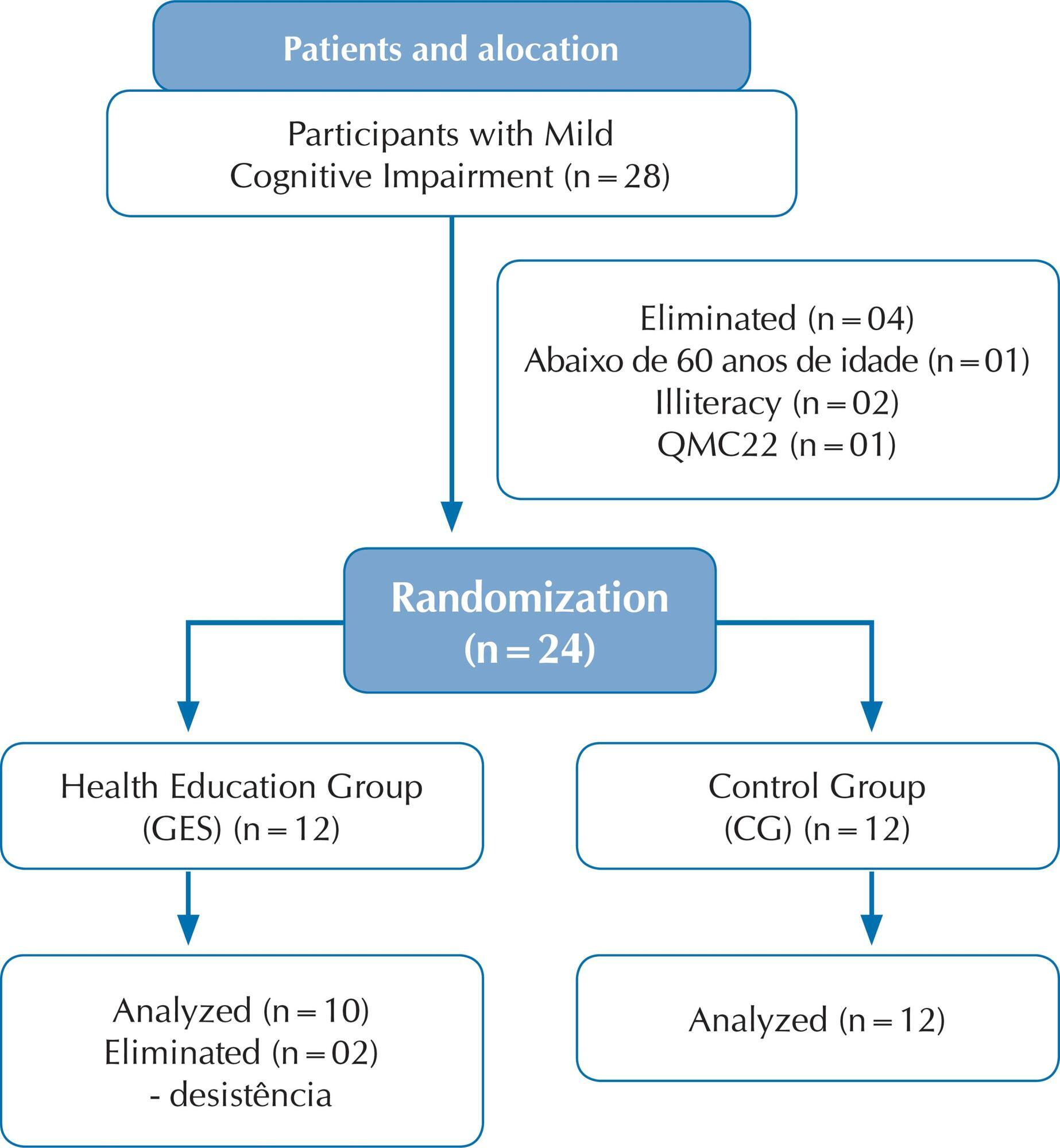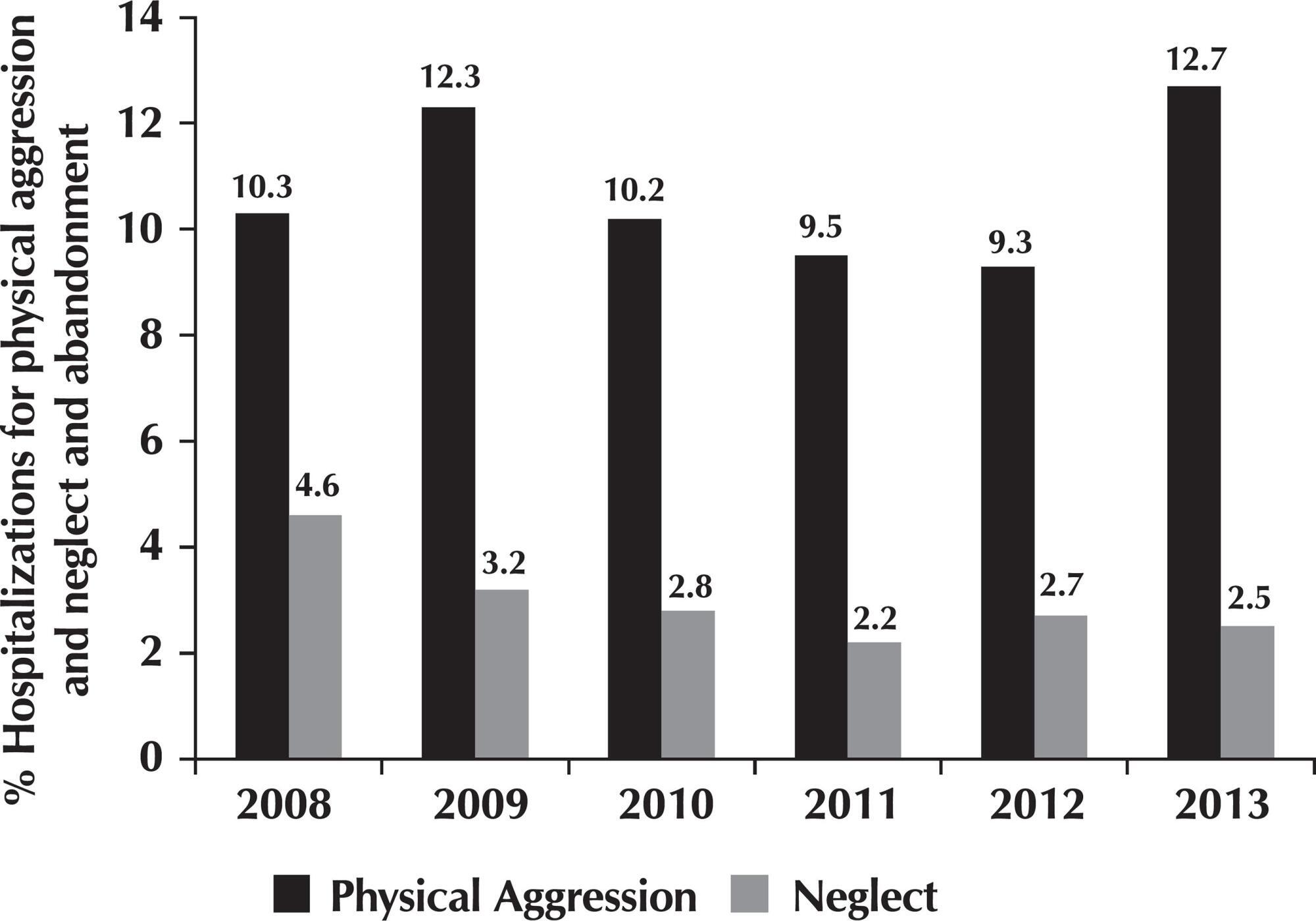-
RESEARCH01-01-2018
Effects of health education in the elderly with mild cognitive impairment
Revista Brasileira de Enfermagem. 2018;71:801-810
Abstract
RESEARCHEffects of health education in the elderly with mild cognitive impairment
Revista Brasileira de Enfermagem. 2018;71:801-810
DOI 10.1590/0034-7167-2017-0032
Views0See moreABSTRACT
Objective:
to analyze the effects of health education on both cognition and depressive/anxiety symptoms in the elderly with Mild Cognitive Impairment (MCI).
Method:
this is a randomized and controlled clinical trial. Participants (n=22) were recruited from a specialized outpatient clinic, and assigned into two groups: a Health Education Group (HEG) (n=10) and a Control Group (CG) (n=12). The participants were evaluated before and after the intervention, which was composed of classes and dynamics. The intervention consisted of 20 meetings, over a period of five months. The assessment was performed by means of the Addenbrooke’s Cognitive Examination – Revised (ACER), the Mini-Mental State Examination to access participant’s cognitive state, and the Beck’s Scale to access depressive/anxiety symptoms. A Memory Complaints Scale (EQM) was also used. The analysis was carried out using the Student’s t test for paired samples.
Results:
the HEG group demonstrated an improvement in attention/orientation (p= 0,026), memory (p=0.001), language (p= 0.033), and ACE-R (p= 0.003). On the other hand, the CG did not present improvement.
Conclusion:
the results highlight the importance of non-pharmacological interventions in older adults with MCI to reduce cognitive deficits.

-
RESEARCH01-01-2018
Self-care of elderly people after the diagnosis of acquired immunodeficiency syndrome
Revista Brasileira de Enfermagem. 2018;71:793-800
Abstract
RESEARCHSelf-care of elderly people after the diagnosis of acquired immunodeficiency syndrome
Revista Brasileira de Enfermagem. 2018;71:793-800
DOI 10.1590/0034-7167-2017-0248
Views0See moreABSTRACT
Objective:
to characterize the seropositive elderly for the Human Immunodeficiency Virus and Acquired Immunodeficiency Syndrome (HIV/AIDS) in their socio-demographic aspects; to understand how the elderly take care of themselves from the diagnosis of HIV/AIDS.
Method:
Qualitative, descriptive, exploratory research conducted at a Voluntary Counseling and Testing Center with 10 elderly people receiving treatment for HIV/AIDS. The data were analyzed according to the content analysis.
Results:
Data show the elderly people’s lack of knowledge about HIV/AIDS transmission, the experience of being elderly and having HIV/AIDS, caring for oneself and life after diagnosis of HIV/AIDS in their daily lives.
Final considerations:
The diagnosis of HIV/AIDS seropositivity in the elderly generates a blend of feelings and fears that lead to food changes, adherence to treatment and the renunciation of daily and social habits, manifested as ways of self-care.
-
RESEARCH01-01-2018
Educational technology: a facilitating instrument for the elderly care
Revista Brasileira de Enfermagem. 2018;71:786-792
Abstract
RESEARCHEducational technology: a facilitating instrument for the elderly care
Revista Brasileira de Enfermagem. 2018;71:786-792
DOI 10.1590/0034-7167-2017-0129
Views0See moreABSTRACT
Objective:
To develop educational technology with caregivers of older people based on the needs, difficulties and concerns related to the elderly care expressed by the caregivers themselves.
Method:
Research of qualitative nature, with participant observation, based on concepts used by Paulo Freire. Data collection and analysis used the “World Cafe” methodology and the thematic content analysis, respectively.
Result:
The needs of these caregivers refer to their training and information on aging. The difficulties highlighted are deterrents to quality assistance to older adults, such as: insufficient resources, environmental factor and relationship with the family. The interests are evident in relation to the care and to its more subjective relationship.
Final considerations:
Educational technologies, printed matter and media, developed along with the caregivers, contribute to orientation and information of caregiver, population and professionals as facilitating instruments, regarding elderly care.
-
RESEARCH01-01-2018
Violence against the Brazilian elderlies: an analysis of hospitalizations
Revista Brasileira de Enfermagem. 2018;71:777-785
Abstract
RESEARCHViolence against the Brazilian elderlies: an analysis of hospitalizations
Revista Brasileira de Enfermagem. 2018;71:777-785
DOI 10.1590/0034-7167-2017-0139
Views0See moreABSTRACT
Objective:
to identify the prevalence of physical aggression and neglect and abandonment in the hospitalizations of Brazilian elderly people for violence and assault from 2008 to 2013 and the association of these causes with socio-demographic variables related to hospitalization.
Method:
quantitative, descriptive, cross-sectional study with elderlies hospitalized for assault. Inclusion criteria: to be 60 years old or over, to have been hospitalized in the Unified Health System (SUS) for assault or neglect and abandonment, between 2008 and 2013. The data were collected in February 2016, in Datasus database and descriptive and inferentially, using the Chi-square distribution, in the Epi Info 3.5.4 program.
Results:
the prevalence of hospitalizations due to assaults and violence prevailed among 60 and 69 years old men in the public sector. For abandonment and neglect, there was a higher prevalence in women, over 80 years old, in the public sector.
Conclusion:
nurses must be able to identify and prevent violence against the elderly.

-
RESEARCH01-01-2018
The meaning of religion/religiosity for the elderly
Revista Brasileira de Enfermagem. 2018;71:770-776
Abstract
RESEARCHThe meaning of religion/religiosity for the elderly
Revista Brasileira de Enfermagem. 2018;71:770-776
DOI 10.1590/0034-7167-2017-0120
Views0See moreABSTRACT
Objective:
To understand the meaning of religion/religiosity for the elderly.
Method:
A qualitative, phenomenological study, based on Martin Heidegger. Thirteen older women registered in an Urban Social Center of Salvador, Bahia, Brazil aged between 60 and 84 years participated in the study. The collection of testimonies was carried out from November 2013 to May 2014 through phenomenological interviews.
Results:
Hermeneutics has unveiled the unit of meaning: Meanings of religion/religiosity in the daily life of the elderly. Religion/religiosity offers comfort and well-being to the elderly person, helping to overcome changes arising from the aging process.
Final considerations:
The nurse, while providing care, should expand his/her vision in relation to the subjectivity of the elderly, in order to understand that religion/religiosity gives meaning to their existence.
-
RESEARCH01-01-2018
Repercussions of hospitalization due to fall of the elderly: health care and prevention
Revista Brasileira de Enfermagem. 2018;71:763-769
Abstract
RESEARCHRepercussions of hospitalization due to fall of the elderly: health care and prevention
Revista Brasileira de Enfermagem. 2018;71:763-769
DOI 10.1590/0034-7167-2017-0069
Views0See moreABSTRACT
Objective:
To know the repercussions of the fall reported by the elderly and their caregiver during hospitalization in a public hospital in Florianópolis city from October to December 2014.
Method:
Exploratory research with a qualitative approach, conducted by depth interviews with 16 participants, the eight elderly were hospitalized for falls and eight elderly caregivers. Data analysis were performed through the Thematic Content Analysis.
Results:
It was evidenced the thematic axis: Faller Elderly supported by four thematic categories: Changes caused by Falls, I am a faller, I take care of me and Prevention of the Fall. The repercussions of the fall were evidenced in the impairment of the health condition, self-care and functional capacity. We observed the naturalization of the phenomenon and the passivity with the harmful consequences of the event.
Final Considerations:
The fall is valued the more negative its repercussion, such as the need for hospitalization and surgery. Managing the vulnerability of the elderly, especially in primary care, evaluating their comorbidities and their internal and external environment, will minimize unfavorable consequences and the social and financial cost of hospitalizations.
-
RESEARCH01-01-2018
Suicidal ideation and attempt of older women in Northeastern Brazil
Revista Brasileira de Enfermagem. 2018;71:755-762
Abstract
RESEARCHSuicidal ideation and attempt of older women in Northeastern Brazil
Revista Brasileira de Enfermagem. 2018;71:755-762
DOI 10.1590/0034-7167-2017-0413
Views0See moreABSTRACT
Objective:
to associate the life experiences of older women from the Northeast of Brazil with their suicidal ideation and attempts.
Method:
Qualitative study with fourteen older adults from Piripiri (PI), Teresina (PI), Fortaleza (CE) and Recife (PE) who were interviewed between November 2013 and July 2014. The organization of data originated the themes: experiences of abuse throughout their lives; marital fractures and social isolation; weakened motherhood.
Results:
The women were born and lived most of their life in the countryside, amid poverty and social exclusion. They had a history of abuse, physical and sexual violence, perpetrated by intimate partners and/or family members. They experienced social isolation, weakened emotional bonds and several suicide attempts.
Final considerations:
The life of these older women was affected by traumatic events that enhanced feelings of hopelessness, depressive symptoms and the absence of a plan for the future, making them consider suicide as a way to anticipate death.
-
RESEARCH01-01-2018
Validation of the Falls Efficacy Scale – International in a sample of Portuguese elderly
Revista Brasileira de Enfermagem. 2018;71:747-754
Abstract
RESEARCHValidation of the Falls Efficacy Scale – International in a sample of Portuguese elderly
Revista Brasileira de Enfermagem. 2018;71:747-754
DOI 10.1590/0034-7167-2017-0497
Views0See moreABSTRACT
Objective:
to translate and adapt Falls Efficacy Scale – International (FES-I). To analyze the psychometric properties of the FES-I Portugal version.
Method:
psychometric study. Sample consisting of 170 elderly people residing in the Autonomous Region of Madeira. A two- part form was used (sociodemographic characterization and FES-I Portugal). The cross-cultural adaptation was performed and the following psychometric properties were evaluated: validity (construct, predictive, and discriminant), reliability (Cronbach’s alpha), and inter-rater reliability.
Results:
the results allow us to verify a dimension of less demanding physical activities and another of more demanding physical activities. The inter-rater reliability study was 0.62, with an interclass correlation coefficient of 0.859, for a 95% confidence interval. The internal consistency of the Portuguese version was 0.962.
Conclusion:
the validity and reliability of the FES-I Portugal are consistent with the original version and proved to be appropriate instruments for evaluating the “impaired walking” and “risk of falls” nursing diagnoses in the older people.
Search
Search in:
Nuvem de Tags
Adolescente (85) Atenção Primária à Saúde (239) COVID-19 (91) Criança (91) Cuidados de Enfermagem (269) Educação em Enfermagem (151) Educação em Saúde (139) Enfermagem (930) Enfermagem Pediátrica (86) Estudantes de Enfermagem (77) Estudos de Validação (131) Família (87) Idoso (208) Promoção da Saúde (99) Qualidade de Vida (104) Saúde do Trabalhador (86) Saúde Mental (145) Saúde Pública (82) Segurança do Paciente (150) Tecnologia Educacional (100)



